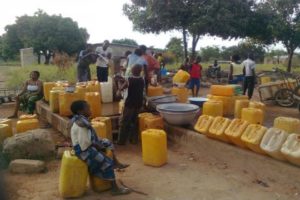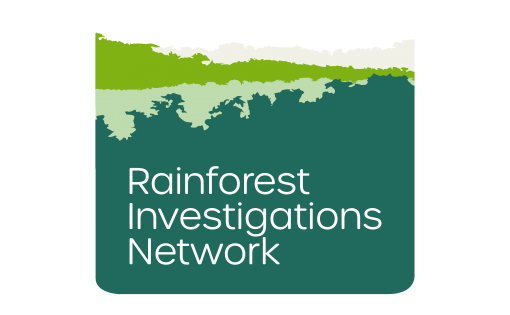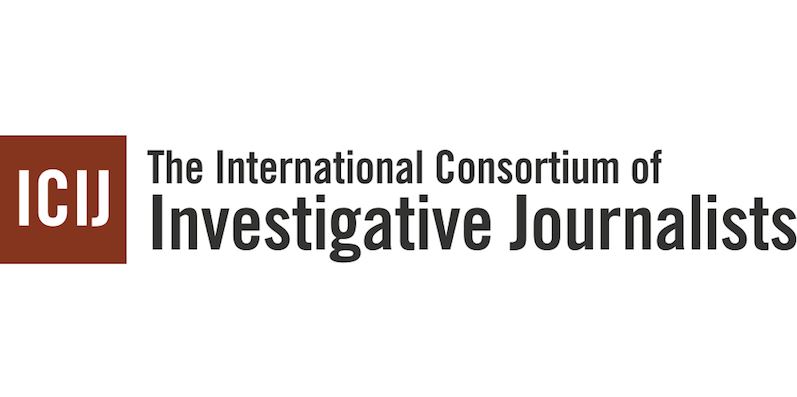There is no road connecting the Obang villages in Manyu in South West Cameroon to any market town – a sad state of affairs, considering that farmers need a road to be able to bring their produce to consumers.
It is not that there was never any money to build one, though. An annual budgetary allocation to construct the needed roads was made to a contractor, a Mr Ndifor (1), starting from the early 2000’s. When I encountered the elusive Mr Ndifor at a party in Yaoundé, I asked him about it. Ndifor said he did not know the said villages. Reminded that he was supposed to have built roads through these very villages, the man laughed and said: “Oh, that. Don’t believe everything you read in the state budget.”
That meeting took place fourteen years ago, in 2005. Today there are no roads in the Obang area save for the old timber extraction sand roads that were always there. And since the timber companies, after depleting it, have stopped extracting wood from the forest, they are virtually impassable now.
You should not believe everything you read in the state budget
Ordinary citizens of Cameroon have spent the past four decades, all governed over by President Paul Biya, now 86, like this: seeing money pass by like mirages and rarely receiving any benefit of it. During the October 2018 presidential election campaign in Cameroon, in a TV debate, a panelist for an opposition candidate asked a Biya representative to name just one single development project that his government in its thirty-six years in power had completed successfully. Hard-pressed for an answer, the representative started harping on Biya’s long experience as a head of state without answering the question.
Even official reports note that state activities very often do not benefit the population. The 2016 report of the Regional Follow-up Commission for Public Investment Projects of the East Region (2) says that in 2015 alone, forty percent of all investment projects earmarked for the region were abandoned. They included road infrastructure projects, health facilities, classrooms, and water bore holes: all executed badly by those charged with managing them and, probably, most often also fleeced.

Reports on losses to corruption in the country differ wildly, from two million US$ in a five year period to one and a half billion US$ over the past decade. Deciding which one you go with depends for a large part on your definition of corruption: where does it start and stop? Outright theft from state contracts -such as roads- may happen in a part of the cases, but what about state salaries paid to nepotist appointments of incompetent individuals, massive perks and bonuses for ministers and high officials, subsidies for development NGOs and catering companies that happen to be run by friends and relatives of ruling party politicians? The Organised Crime and Corruption Reporting Project (OCCRP) calculated last year that President Biya spends at least three US$ million every year on visits to Geneva, Switzerland, alone (3).
The anti-corruption commission CONAC does good work in unearthing fraudulent state expenditure on big projects. But the political powers-that-be decide if the identified culprits go to jail or whether the report in question is ignored. (More on this below.)
Ghost farmers
This, then, is Cameroon as we know it: a country that could hardly ever build or maintain a road, hospital, school, bus route, agricultural or employment project without it being used for own gain by those close to power; that is, to Paul Biya. It is the country where in 1982, the year President Biya came to power, a new paper mill burned down two months after its opening after ‘experts’ without much expertise -their feasibility studies were never subjected to verification or peer review- had pocketed the equivalent of sixteen million US$ (4).
It is the country where the farmers’ loans bank Fonader went bankrupt in 1989 after having loaned most of the moneys to non-existent ‘ghost’ farmer accounts behind which hid friends and relatives of the managers (5); and where the grains development initiative Sodeblé closed its doors after barely producing only one twentieth of the 120,000 tonnes of corn per year the government had promised.
The downfall happened amid much muttering about how the outfit had “financed voyages, baptisms, marriages and various kinds of gifts for senior staff of the company as well as administrative officials of the region.” (6) Sodeblé never reopened; Cameroon still spends around three million US$ of its foreign reserves yearly on the importation of corn alone.
Sodeblé had financed voyages, baptisms, marriages and various kinds of gifts
Immunity
Under the pressure of donor countries an anti-corruption commission was established in the country in 2006. The investigations of the Anti-Corruption Commission of Cameroon, CONAC, have since led to some hard-hitting reports, incidental recovery of moneys and occasionally even to arrests and imprisonment of culprits. Most notably among these was a former Prime Minister, Ephraim Inoni, who was arrested in 2012 after having been implicated in decades of large scale embezzlement that had bankrupted the national airline Camair. (Ironically, Inoni himself had kickstarted the judicial anti-corruption drive – called Operation Sparrowhawk – to add to the work of the anti-corruption commission six years earlier).
However, Biya’s inner circle and favourites always seemed immune. A report by CONAC in 2011 (7) that accused then secretary general in the Prime Minister’s office Jules Doret Ndongo of complicity in double-invoicing the state for the construction of a road in the centre of the country – at an extra cost of thirty-one million US$ – was strongly contested by the Ministry of Public Works, which called it “false.” Its implications were ignored and Doret Ndongo is still a minister today. Likewise, nothing at all happened when current Minister of Finance Louis Motaze – in 2011, when he was Minister of Transport – overspent twelve million US$ state money on an inflated invoice for two Chinese airplanes, even after opposition MP Joshua Osih accused Motaze in parliament of diversion of the funds to benefit a ‘mafia.’
Nothing happened when the Minister of Transport overspent US$ 12 million
Media and opposition parties have denounced Cameroon’s corrupt systems and judicial favoritism for years. But, like CONAC, these are often also ignored, which is made easier because of the abundant amounts of fake news and ‘brown envelope’ journalism – the practice whereby hacks in the media accept money from powerful individuals to publish stories that favour these individuals and slander their rivals in the country. As a result, the system always remained the system: to advance in Cameroon, you simply had to maneuver yourself as close as you could get to any Biya government and ruling party official, hope for spoils, and start living the high life when your efforts paid off.
As former Minister of National Education, now one of Cameroon’s opposition party leaders, Adamu Ndam Njoya once put it: “We are yet to see the day that, when a Cameroonian is appointed to a high post of responsibility, they bend their heads down and cry due to the heavy responsibilities that go along with the post. On the contrary, people always organise feasts to celebrate appointments and this because the appointees and their families and close ones see in the appointments the opportunities to enrich themselves from the budgets allocated to positions to which they have been appointed. The bigger the budget, the bigger the festivities ».
The bigger the budget, the bigger the festivities
Very unpopular
Even when new enterprises were established with the explicit intention to put them on good management footing, often with outside help, it kept going wrong. In 2012, a new farmers’ loan scheme, Credit Agricole, suffered the same fate as the previous rural bank Fonader, even though it had been assisted by the German Investment and Development Corporation (DEG) and was managed by an equally German manager, Hubert Rauch. When it was liquidated, Credit Agricole was owing its customers the equivalent of US$ 314 million due to bad debts contracted mostly by ministers, general managers of state corporations and other senior government officials.
And though a source in the Ministry of Finance at the time roundly admitted that “big government and ruling party officials had borrowed large sums of money knowing they would never pay back” and that “manager Hubert Rauch was induced in error to grant (the) loans to several barons of the ruling party,” the downfall was blamed on one sole individual: the bank’s liquidator Frederick Ekande, a judicial expert and former Member of Parliament. Convicted of embezzling the equivalent of over and a half million US$, Ekande still languishes in jail.
The pattern again repeated itself when in 2011 a new airline was started to replace the bankrupt Camair. Even though two managers had already been jailed, and a Prime Minister was about to follow the same fate, for the “mismanagement, embezzlement, and excessive borrowing,” that had destroyed the previous airline enterprise, the practice by “ministers and general managers of state corporations (to) take their wives and girlfriends on jolly rides round the world without buying tickets (8)” simply started again in Camair-Co. Once again, also, there was “excessive recruitment” of workers “without necessary qualifications” who had been “brought in by the usual godfathers in high places (9).” All this happened again, even if there were now two Dutch new managers seconded to the enterprise with an explicit mission to put the airline on the right path.
They lasted less than two years. At his departure in 2012 the first Dutch manager, Alex van Elk told local press that his attempts to “streamline the recruitment process according to international norms” had been thwarted by senior government officials who had once again imposed “unskilled staff” on the company. Johannes Boertien, who had been Van Elk’s deputy and took over after the latters’ departure, lasted until September 2013 but then also left, saying that he had not been able to “put into practice his management roadmap.” A Cameroonian publication revealed that Boertien had become “very unpopular for solely appointing a commercial director for the corporation without the concern of the other board directors,” with the directors’ concern, presumably, for the individuals they had wanted to appoint (10).
Even a whole series of six public-private partnerships – called CARPA (Conseil d’Appui a la Realisation des Contrats de Partenariat) – that was, under the watchful eye of French development organisations and the World Bank, to create tramways, a hospital, an entire university city and rail transport network from 2013 onwards- delivered little besides, as one Cameroon news site called it in April his year, ‘flops.’ “Most of those charged with seeing to the realisation of the projects are not enthusiastic about them because (…) they don’t see the possibility of personal gains for themselves by way of kickbacks and bribes”, a senior official in the Ministry of the Economy, Planning and Regional Development said when asked to comment.
Palace wars
But as Paul Biya ages, some change finally seems to be on the horizon. What anti-corruption investigations, opposition parties and foreign development partners’ consultancies could not achieve, -an end to the Biya kleptocracy-, might now occur naturally as its founder is about to turn 87 years old. The problem is that no one can foresee what will replace it.

The supreme godfather started leaving the reins of Cameroon in the hands of a new generation in January this year. A new state minister, a confidante of Paul Biya’s wife Chantal called Ferdinand Ngoh Ngoh, started taking over the day to day work of governing. It set tongues wagging in Yaoundé. Was Ngoh Ngoh going to be a seamless successor, a new Biya? Or was he, as a close friend of Biya’s much younger wife Chantal (48) – the two even came from the same village in Cameroon’s Nanga Eboko community – actually part of a new faction about to take power away from Biya’s predominantly ethnic Bulu elite? And if there was such a new faction, what would that mean in terms of privileged access to state coffers and legal protection?
Chantal was holding Paul Biya’s hands and doing his waving for him
Simultaneous new appointments in the government seemed to confirm that Chantal Pulchérie Biya-Vigouroux – whose flaming red big hairdos have inspired the creation of entire websites – had her own designs on power. Not only was her old friend Ngoh Ngoh, now the most powerful minister in Cameroon, another four new ministers and high level bureaucrats had all previously worked, or still worked, with Chantal’s office, charity foundations, or church. Chantal had for some time been seen as a force ready to take over from her husband, an impression that was reinforced again when she, at a public event in May this year, appeared next to a very old and weak looking Paul, holding his hands and doing his waving for him.
The rumours were fueled by the pan-African francophone monthly Jeune Afrique, which, in February this year, wrote about Chantal’s rise. Not to be outdone, the pro-Biya newspaper l’Avocat then even printed a picture of Ferdinand Ngoh Ngoh on its front pages headlining “a mafia out to conquer power.” In a tweet Chantal Biya angrily denied having any such designs and insisted that she remained only interested in charity work.
But then, yet another former Biya acolyte, veteran minister Laurent Esso – now minister of justice – was said to make a play for the succession. Many a Yaoundé palace watcher interpreted the increased public antics of Esso’s close associate, TV mogul Amougou Belinga, as a sign of the justice ministers’ participation in the race. When Belinga’s TV Channel Vision4 published ethnic hate speech (11) of a kind that could have meant a prison term under the country’s strict defamation laws, not only did Belinga get off scot free, but the head of the Communications Commission, Peter Essoka, was fined the equivalent of US$ 30, 000 after Belinga complained that he had ‘damaged’ him by comparing his TV station to the genocidal Radio Mil Collines in Rwanda.
Next, relatively lowly Vision4 reporter Parfait Ayissi was mysteriously released after having been arrested for the rape of a 14-year old. When, after his release, Ayissi repeatedly mocked the girl on TV with impunity, too, Yaoundé’s elites started asking themselves which powerful new godfathers they should now turn to for assistance and protection.
A weakened hand
It was surely not so much Biya anymore. Because even individuals who had always been close to the president, had recently been rounded up by the police. Last year that fate already befell businessman Mohammadou Dabo, a big sponsor of the ruling party and a close associate of Biya himself. Though the fact that Dabo had pocketed an advance of over one million US$ to renovate Garoua airport in 2011 and had delivered nothing since had not bothered the justice system for seven years, Dabo was suddenly in and out of court for interrogation and could, according to a source at the Special Criminal Tribunal, soon be doing actual jail time for “deceit of associates, crookery, forgery of commercial and bank documents and embezzlement of public funds.” “All indications are that it is almost certain that he will not (remain) a free man for long,” the source, a senior lawyer in the office of the prosecutor at the Special Criminal Tribunal, said.
Suddenly even ‘sons’ of Biya were arrested
Then in January this year, even more shockingly, former Minister of Defence Edgar Alain Mebe Ngo’o was arrested for a corrupt arms procurement deal with French company MagForce (12). The contracts in question had been signed years ago, in 2010 and 2011, and French justice authorities -who had arrested MagForce counterparts in France- had pressured Cameroon to take action against him since at least 2014, but publications both in France and Cameroon had surmised that Mebe Ngo’o enjoyed so much protection that he would never face the law. The man was always very intimately connected to President Paul Biya after all; Yaoundé pundits and their radio trottoir even commonly refer to him as Biya’s illegitimate “son.”
The arrest in January therefore sent a shockwave through Cameroon. The pundits, quoted in many a newspaper and on radio, now said that “the faction” of Ferdinand Ngoh Ngoh and Chantal Biya were “behind the arrest.”
And then it happened to yet another Biya ‘son’, too (13). This time the target was Gilbert Baongla, a politician who leads the opposition Republican Party. Baongla, who has gone around saying he is Biya’s son for years without being contradicted, had also always enjoyed protection. He seemed to have an extraordinary privilege when it came to speaking his mind wherever and whenever he wanted: he even once accused powerful minister Atanga Nji of corruption, conspiracy and ‘betraying the people’ on prime time TV without suffering any consequence.
But in early June Gilbert Baongla, too was arrested, after a complaint by none other than Justice Minister Esso’s close friend, TV boss Amougou Belinga, whom he had accused of smuggling and espionage (14).
A good looking road
Whether the succession struggle, with its weakening of the presidents’ iron grip on the state, will result in a better-run country remains doubtful. The judiciary under Esso seem to suffer as much from favouritism as always, and new minister of State Ferdinand Ngoh Ngoh -he who is associated with the ‘Chantal faction’ – has already been implicated in disastrous construction contracts around the African Cup of Nations, as a result of which – simply because needed roads, hotels and stadia were never built Cameroon lost the opportunity to host the soccer event this year.
There have been signs, though, even if ever so faint, that civil servants – perhaps motivated by uncertainty around their positions and career paths, or, in contrast, perhaps finally enjoying space to focus on their actual jobs – have started to achieve better results than before. The Ayos-Abong Mbang-Bognis road, the focus of the 2010 double billing scandal, is actually looking well-maintained today. A recent set of roads scheduled to be completed last year in the usually neglected south-and north west of Cameroon, has been almost totally completed.
Even if in some cases the roads had once again come with a heavier price tag than they should have had, and a few were delayed due to armed action by militants who have taken up arms against the Yaoundé state, our team (15) found that almost all had indeed been built. What seems to have helped is the increasingly rigorous practice by donor organizations of withholding money until actual results are visible.
Another new development is the establishment by law enforcement agencies of toll free numbers through which citizens can denounce wrongdoings.
The old elite may spawn new kleptocratic factions
On the other hand, as the interregnum plays out, there is a real danger that the victorious candidate for Paul Biya’s succession may simply re-establish the kleptocracy in his -or her- own image. Another scenario is a prolonged fight between the factions for access to various troughs, which will risk fragmenting the entire state. If that happens, the military may feel justified to take power with the excuse of re-establishing law and order.
A first sign of such a possible scenario unfolding was the circulation in the media, early June, of a rather curious unsigned declaration purportedly from senior military officers which criticised the factional fighting between what it called the (ethnic) “Bulu clan” around Paul Biya and Chantal Biya’s “Nanga Eboko” community. In the letter, the anonymous military men threatened to intervene if the situation was not redressed pronto.
If that letter is authentic (which it may not be, because you never know in Cameroon), there is a third force building up within the military. And with Cameroon’s military riddled with embezzlement as well as human rights abuse scandals, this would undoubtedly be the worst case scenario. The international community might take note.
This story is part of « Public Disservice: How poor African countries waste billions », a transnational investigation by African Investigative Publishers Collective (AIPC).
References:
- Name changed; he has since died and could therefore not be asked for comment.
- For the Regional Report see: https://allafrica.com/stories/201602241006.html.
- For the OCCRP investigation click here https://www. occrp.org/en/investigations/7653-paul-biya-cameroon-s-roaming-president.
- According to an investigation done by a group of journalists (of which Chief Bisong Etahoben was part) at the time.
- The takeover by the ‘elites’ of smallholdings previously formally subsidised by Fonader is documented here: http://www.cifor.org/publications/pdf_files/ WPapers/WPaper139Nkongho.pdf.
- According to interviewed Sodeblé staff members at the time.
- The affair is described by Franklin Tougwa on www. researchgate.net.
- According to Camair sources and later also CamairCo sources who were interviewed at different occasions over time.
- Idem
- See https://cameroonpostline.com/cameroonianborn-mbotto-edimo-is-new-camair-co-gm/
- The hate speech was directed against Cameroons’ anglophone population, who have long felt disadvantaged by the francophone elite in Yaoundé. During the rant, the senior commentator on Vision4 equated all anglophones to a small group of insurgents now active in the country’s north west region and called for action against “all the terrorists.” See: http://cameroonnewsagency.com/40-bitter-anglophone-journalists-petition-ncc-hate-speech-vision-4-journalist-anglophones/.
- See for example https://www.jeuneafrique. com/748540/societe/soupcons-de-corruption-au-cameroun-les-enquetes-qui-touchent-mebe-ngoo-sepoursuivent/ (French).
- Biya has, next to his official offspring, at least three such ‘illegitimate sons’: Minister of Finance Louis Motaze -he of the Chinese planes-is rumoured to be the third one.
- See: http://natimesnews.com/yaoundenational-timesthe-purported-eldest-son-of-president-paul-biyageorges-gilbert-baongla-has-been-arrested-and-detained-at-the-yaounde-judicial-police/
- The NGO Data Cameroon http://datacameroon.com/ helped to map a set of roads and then carry out the check on their completion.





